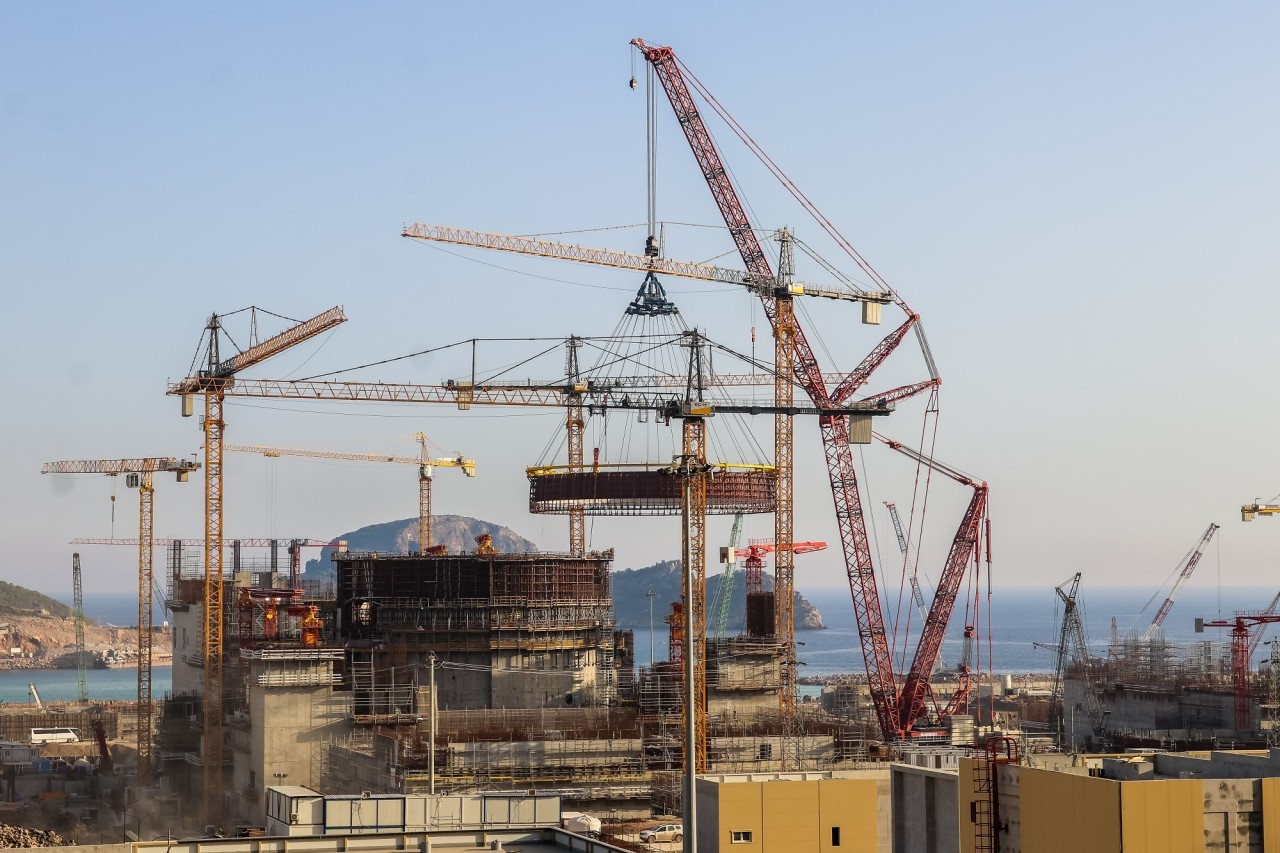 The fifth tier of the internal containment (VZO) has been installed at unit 2 of the Akkuyu NPP under construction in Turkiye. The VZO, which ensures the protection and tightness of the reactor compartment, consists of a steel cladding and a special concrete mixture, which is produced directly at the Akkuyu NPP construction site. Previously, 12 metal sections were welded together into a single ring structure weighing 129 tons. Then, using the world’s most powerful crawler crane the tier was placed at the design level in the reactor building.
The fifth tier of the internal containment (VZO) has been installed at unit 2 of the Akkuyu NPP under construction in Turkiye. The VZO, which ensures the protection and tightness of the reactor compartment, consists of a steel cladding and a special concrete mixture, which is produced directly at the Akkuyu NPP construction site. Previously, 12 metal sections were welded together into a single ring structure weighing 129 tons. Then, using the world’s most powerful crawler crane the tier was placed at the design level in the reactor building.
Sergey Butskikh, First Deputy General Director of project company Akkuyu Nukleer, said installation of the fifth tier is technologically complex and requires careful preparation. “The fifth tier connects the cylindrical and domed parts of the inner containment. Our many years of experience in construction allows us to save time in assembling and installing containment modules. Installation of the fifth tier lasted only two hours. Now the height of unit 2 has increased by 6.5 metres and has reached 43.1 metres.”
Simultaneously with the construction of the inner containment, construction of the external and internal walls of the reactor building is under way as well as installation of embedded parts for transport, pedestrian and back-up locks. Earlier in June concreting of the dome of the VZO at unit 1 was completed.
The reactor buildings at the Akkuyu NPP power units are equipped with double containment. The outer protective shell is formed from reinforced concrete and designed to withstand extreme external influences including magnitude 9 earthquakes, tsunamis, hurricanes, as well as their combinations.
Akkuyu, Turkiye's first NPP, will eventually host four Russian-designed VVER-1200 reactors. The pouring of first concrete for unit 1 took place in April 2018, for unit 2 in June 2020, for unit 3 in March 2021, and for unit 4 in July 2022. Completion of unit 1 is expected in the third quarter of 2023. Rosatom is constructing the reactors according to a build-own-operate model. To date, the project is fully funded by the Russian side. However, Rosatom has the right to sell a share of up to 49% in the project to other investors.
Under the terms of the Intergovernmental Agreement between the Russian Federation and the Republic of Turkiye, commissioning of unit 1 should take place within seven years after receiving all necessary permits. As the construction licence for unit 1 was issued in 2018, commissioning is formally due by 2025. However, every effort is being made to ensure that it will be ready in time for Turkiye’s centenary celebrations in 2023.
Turkish Ministry of Energy Salih Sari, speaking at the Nuclear Power Plants V Expo and IX Summit (NPPES-2023) in Istanbul said Turkiye plans to start generating electricity from Akkuyu in 2024. “Nuclear fuel was delivered to Akkuyu on 27 April. We aim to start generating electricity at nuclear power plants next year,” he noted.
A Ministry official told journalists that Turkiye is negotiating the construction of a second NPP in the Black Sea province of Sinop with Russia and South Korea. In addition, negotiations are underway to build a third plant in the Thracia region, and there are also plans for a fourth NPP.
Denis Sezemin, Akkuyu Nukleer Director told the NPPES forum that the Akkuyu NPP project already contributes to economic growth, development of infrastructure, local production, and scientific, educational and industrial expansion. He gave details of the Akkuyu NPP localisation programme. “Over the past year, the total amount of contracts with the Turkish companies for the supply of equipment, materials and services for the project has increased by more than $1bn to $4.3bn.”
Image courtesy of Rosatom



